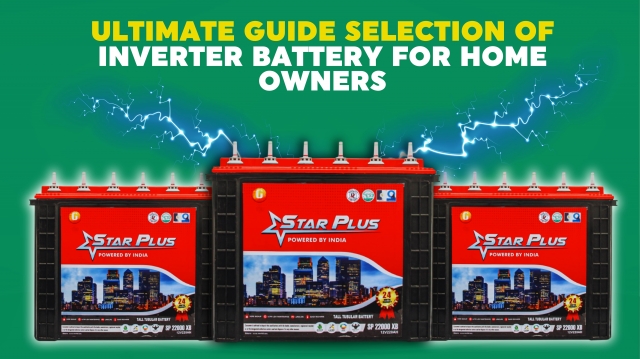Electricity is an essential component in your life. Nearly all work is done with the help of electricity. However, there is something that all of us dread- a power cut. The sudden plunge into darkness is a familiar foe. It disrupts our lives and frustrates our plans. No matter which city you are in, a power outage can throw a wrench in anyone's day. But there is something that can help you get through it- an inverter battery.
An inverter battery is a rechargeable energy storage device that stores electricity in chemical form. It stores direct current (DC) produced by the inverter, which is then converted into an alternative current (AC). This electricity is then supplied to the appliances when there is a power outage. Inverters are designed to provide a steady flow of power to all appliances for long periods of time.
Choosing the right inverter battery, however, can be like navigating a maze. There is a lot of technical jargon and confusing options involved. But there is nothing to fear. In this blog, you will learn the best ways to choose the right inverter battery for you.
Step One: Size Up Your Power Needs
Sometimes, we can become confused and think of buying any battery that we think might fulfill our needs. This is because we can only think of keeping our appliances running. You may get an inverter battery that exceeds your requirements, which might end up damaging your devices. If you get one with a lower capacity, you might not be able to enjoy the benefits of having a battery for longer periods. The way to calculate your energy requirements is simple. Simply grab a notebook and jot down the appliances you absolutely need to keep running. The lights, fans, television, your fridge. List them down, check their wattage labels, and add them up. This is your minimum power requirement and the cornerstone of your quest to choose the best battery for you.
Capacity Counts
The capacity of a battery is the amount of electrical charge it can store. Battery capacity is measured in ampere-hours (Ah). Think of your battery as a kitchen pantry. Would you want to fill it with enough snacks for an hour or a week? You need to select a battery with enough capacity to meet your power requirements during a power outage. Multiply your minimum power requirement by a comfortable outage duration, around 2-3 hours. It should be your ideal battery capacity on ampere-hours. The higher the ampere-hours, the longer the power will be supplied.
Get You Appropriate Battery Type
The proper battery is the backbone of an inverter. Each type of battery has its own unique properties and performance characteristics that will make it ideal for your home. One of the most popular types of batteries is tubular batteries. A tubular battery is a flat plate battery; however, it is much more efficient for homes than other types, like lead-acid or lithium-ion batteries. They are built for deep discharge and are recommended for areas with long durations of power cuts. Tubular batteries have a longer lifespan, require much less maintenance, and have greater reliability. They also require less water topping and charge much faster, which means you are more prepared for the next power cut.
Other Factors To Consider
While capacity and technology are the main components, other factors add the elements that make one battery more desirable than the other.
Warranty
This is probably one of the main points you should consider, too. The warranty of the battery protects you against any defects or premature battery failure. Most batteries have a warranty period of 24 months, which is quite long considering their usage. You may not even need to use the battery for some time. In this case, it is essential to get a battery with an extended warranty period to prevent it from getting damaged while being at a standstill.
Budget
Your budget plays a vital role when choosing an inverter battery. A lead-acid battery is cheaper than most batteries, but it has a shorter lifespan and can require frequent replacements. A tubular battery might be on the pricier side. But it requires less maintenance and has a higher warranty too.
Brand
Last but not least, you should consider the brand of the battery. You can get the guarantee of getting a reliable battery from a reputed brand. Choose one with a track record of producing batteries that last for longer hours and provide a steady supply of power. Check the reviews of different companies and get the ideal battery for your home.
Bonus Tip: Climate throws curveballs at us all. So, choose a battery tested for your region's conditions to ensure peak performance.
The Bottom Line
The perfect tubular inverter battery is a blend of your needs and preferences. Invest in a compatible inverter to make the most of your battery's power. Maintaining your battery is also essential. Regular checkups and proper care will keep it humming along and make blackouts a distant memory. Power outages might be inevitable, but your comfort doesn't have to be. With the right knowledge and this guide as your map, you can choose the perfect inverter battery and keep the lights on, even when the power grid decides to take a nap.






